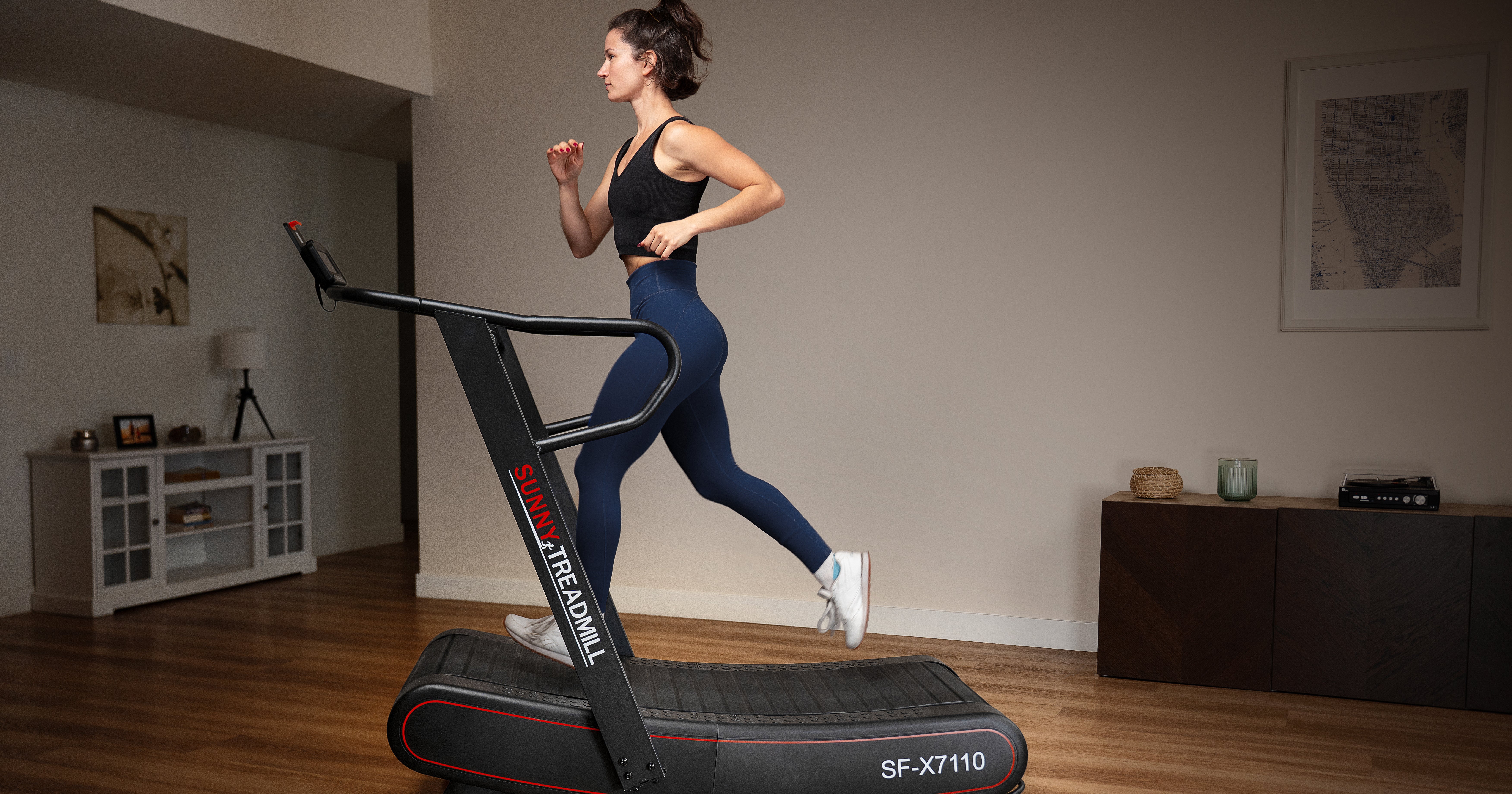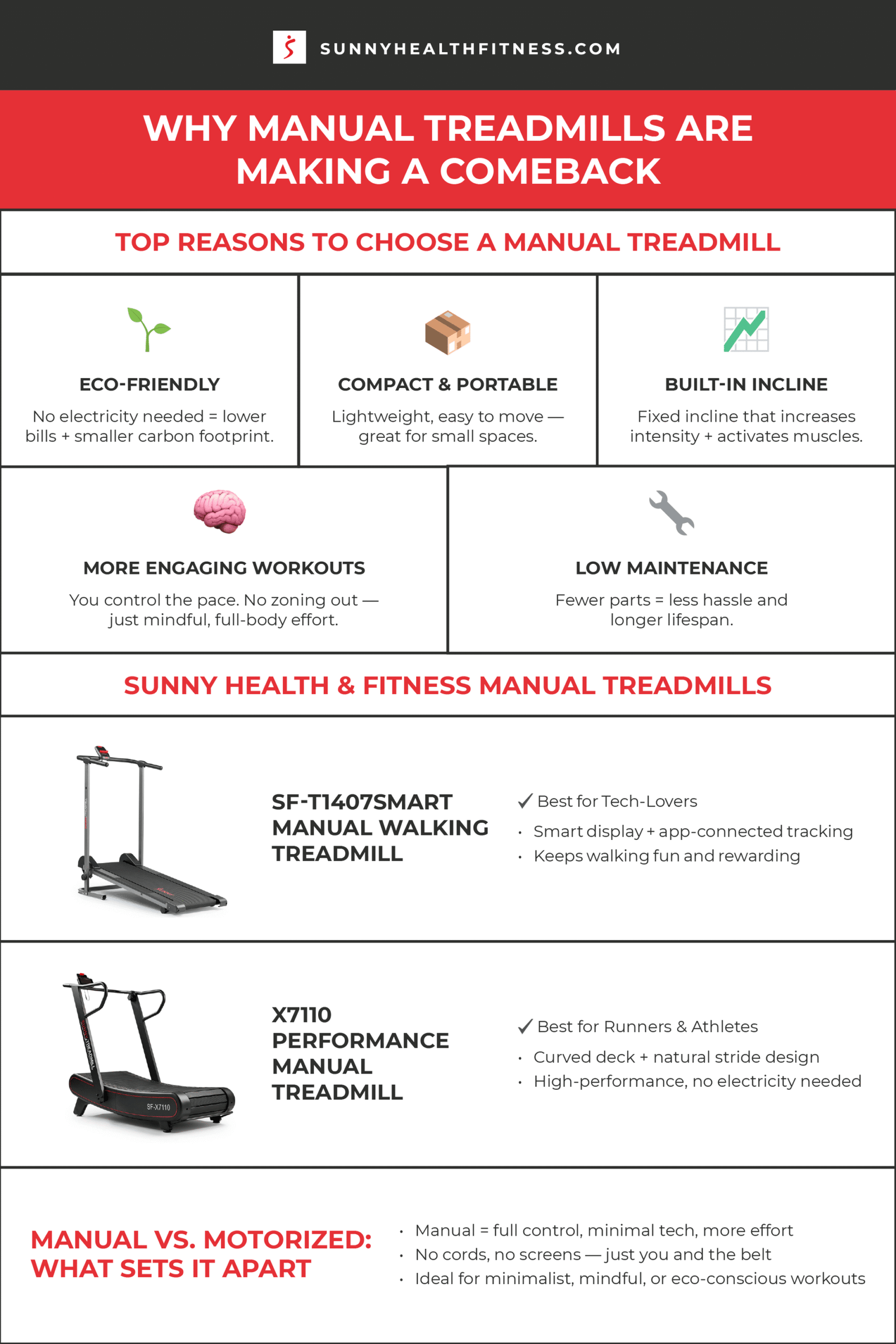Are you thinking about getting a treadmill but feel confused about whether to choose a manual or motorized one? Understanding the key differences can save you time, money, and frustration.
Your workout experience depends a lot on this choice, so it’s important to know what sets these two types apart. Keep reading, and you’ll discover which treadmill fits your lifestyle and fitness goals best. By the end, you’ll feel confident about making the right decision for your health and home.

Manual Treadmill Basics
Manual treadmills are simple exercise machines. They do not use motors to move the belt.
These treadmills are powered by your own steps and effort. They are different from motorized treadmills.
How Manual Treadmills Work
The belt on a manual treadmill moves only when you walk or run. Your feet push the belt backward.
This means the speed depends on how fast you step. There is no motor to set the pace.
Key Features Of Manual Treadmills
Manual treadmills have some unique features. These make them different from motorized types.
- No motor or electricity needed
- Compact and lightweight design
- Speed controlled by user effort
- Often lower cost than motorized models
- Require more physical effort to use
Motorized Treadmill Essentials
A motorized treadmill uses a powered belt to help you walk or run. It has a motor that controls the speed and movement of the belt.
This type of treadmill is popular for home and gym use because it offers smooth and adjustable workouts.
Functioning Of Motorized Treadmills
The motor drives the belt beneath your feet. You can change the speed using controls on the treadmill. This helps you set the pace for walking or running.
The treadmill also has sensors to keep the belt moving steadily. It stops automatically if you step off or if there is a problem.
Main Features Of Motorized Treadmills
- Adjustable speed settings for different workout levels
- Incline options to increase workout difficulty
- Built-in displays showing time, distance, and calories burned
- Safety features like emergency stop buttons
- Quiet motors for smooth operation
| Feature | Description |
| Speed Control | Adjusts belt speed from slow walk to fast run |
| Incline Adjustment | Changes the belt angle to add resistance |
| Display Screen | Shows workout stats like time and calories |
| Safety Stop | Stops the treadmill quickly in emergencies |
| Motor Power | Usually ranges from 1.5 to 4.0 horsepower |
Performance Comparison
Manual and motorized treadmills offer different workout experiences. Understanding their performance can help you choose the right one.
This comparison focuses on speed and control differences, and how they impact workout intensity.
Speed And Control Differences
Motorized treadmills have a motor that sets the belt speed. You can adjust speed easily using buttons or touch screens.
Manual treadmills rely on your leg power to move the belt. You control the speed naturally by walking or running faster.
- Motorized treadmill: speed fixed by motor settings
- Manual treadmill: speed changes with your effort
- Motorized offers precise speed control
- Manual requires more balance and coordination
Impact On Workout Intensity
Manual treadmills often create a harder workout. You push the belt yourself, which uses more muscles.
Motorized treadmills let you set a steady pace. This helps maintain consistent workout intensity for longer sessions.
- Manual treadmill: more muscle engagement and effort
- Motorized treadmill: steady pace and controlled intensity
- Manual workouts can burn more calories quickly
- Motorized treadmills allow easier interval training

Cost And Maintenance
Choosing between a manual and motorized treadmill depends on cost and upkeep. Both have different price points and maintenance needs.
Understanding these differences helps you pick the right treadmill for your budget and lifestyle.
Price Variations
Manual treadmills usually cost less than motorized ones. They have simpler parts and no electrical components.
- Manual treadmills range from $200 to $600.
- Motorized treadmills often start around $600 and can go above $2000.
- Higher-priced motorized models offer more features like speed control and preset programs.
Upkeep And Durability
| Feature | Manual Treadmill | Motorized Treadmill |
| Maintenance Type | Simple cleaning and belt lubrication | Motor and electronic checks, belt lubrication |
| Durability | Long-lasting with fewer parts | Can wear out faster due to motor and electronics |
| Repairs | Usually low cost | Repairs can be expensive, especially for electronics |
| Noise Level | Quiet operation | Motor noise during use |
Manual treadmills need less upkeep and tend to last longer. Motorized models require regular checks of their motor and controls.
Space And Portability
Choosing between a manual and motorized treadmill depends on your space and how easy it is to move. Both types have different sizes and ways to store them.
Understanding these differences helps you pick the best treadmill for your home or gym.
Size Considerations
Manual treadmills are usually smaller and lighter. They lack motors, so their frames can be simpler and less bulky.
Motorized treadmills often have larger frames and consoles. They need space for the motor and electronic parts.
| Type | Typical Length | Typical Width | Weight Range |
| Manual Treadmill | 4 to 5 feet | 2 to 2.5 feet | 40 to 70 lbs |
| Motorized Treadmill | 5 to 7 feet | 2.5 to 3 feet | 100 to 200 lbs |
Ease Of Moving And Storage
Manual treadmills are easier to move and store. They can often fold or be carried without much effort.
- Manual treadmills usually weigh less than motorized ones.
- Many manual models fold flat for storage under beds or against walls.
- Motorized treadmills often have wheels but still need two people to move safely.
- Storage space must be larger for motorized treadmills due to their size and weight.

User Experience
Choosing between a manual and a motorized treadmill affects how you feel during workouts. Both types offer different experiences that can change your comfort and safety.
Understanding these differences helps you pick the best treadmill for your fitness needs and goals.
Comfort And Safety
Motorized treadmills provide a smooth and steady pace controlled by the machine. This control helps users stay comfortable without worrying about speed changes.
Manual treadmills require users to move the belt with their own effort. This can make it harder to keep balance and may cause discomfort if the user is not used to it.
- Motorized treadmills have cushioned decks to reduce joint impact.
- Manual treadmills often lack advanced shock absorption.
- Motorized models include safety features like emergency stop buttons.
- Manual treadmills rely more on user control, increasing risk if not careful.
Suitability For Different Fitness Levels
Motorized treadmills suit beginners to advanced users. You can easily adjust speed and incline to match your fitness level.
Manual treadmills are better for those with good balance and strength. They offer a more intense workout but are harder for beginners.
- Beginners find motorized treadmills easier to use and control.
- Advanced users can customize workouts on motorized treadmills.
- Manual treadmills provide a strong workout but need more effort.
- Manual treadmills may not be suitable for users with joint issues.
Choosing The Right Treadmill
Selecting between a manual and a motorized treadmill depends on your needs and lifestyle.
Knowing the differences helps you pick the best option for your fitness routine.
Fitness Goals And Preferences
Manual treadmills require you to move the belt by your own effort. Motorized treadmills use a motor to move the belt at set speeds.
- Manual treadmills help build strength because they need more effort.
- Motorized treadmills offer more speed options and programs.
- Manual models are usually simpler and quieter.
- Motorized versions track your workout data automatically.
Budget And Space Factors
Manual treadmills are cheaper and take less space. Motorized treadmills cost more and need more room.
| Feature | Manual Treadmill | Motorized Treadmill |
| Price | Lower | Higher |
| Space Needed | Compact | Large |
| Maintenance | Low | Higher |
| Workout Variety | Limited | Wide |
Frequently Asked Questions
What Are The Key Differences Between Manual And Motorized Treadmills?
Manual treadmills require user effort to move the belt, while motorized treadmills use a motor to drive the belt. Motorized versions offer adjustable speeds and incline, making workouts more versatile and consistent compared to the more basic manual models.
Which Treadmill Type Is Better For Weight Loss?
Motorized treadmills are generally better for weight loss due to adjustable speed and incline settings. They allow for varied workouts that boost calorie burn more effectively than manual treadmills, which depend solely on user effort and pace.
Are Manual Treadmills More Affordable Than Motorized Ones?
Yes, manual treadmills are typically more affordable than motorized treadmills. They have simpler designs, no motors, and lower production costs, making them a budget-friendly option for beginners or those with limited space.
How Do Maintenance Needs Differ Between Treadmill Types?
Motorized treadmills require more maintenance, including motor care and electronic checks. Manual treadmills have fewer parts and need less upkeep, usually just belt lubrication and occasional adjustments, making them easier to maintain over time.
Conclusion
Choosing between a manual and motorized treadmill depends on your needs. Manual treadmills offer simplicity and affordability. They need your effort to move. Great for those who like a challenge. Motorized treadmills offer more features and ease. Ideal for varied workouts and tracking progress.
Think about your fitness goals and budget. Consider space and maintenance too. Both types have benefits. Decide which fits your lifestyle best. Enjoy your treadmill workouts!



